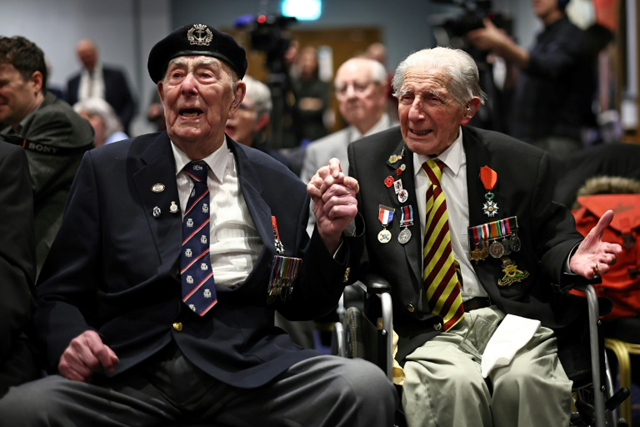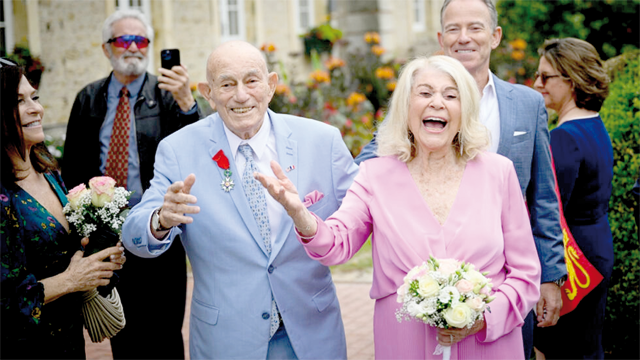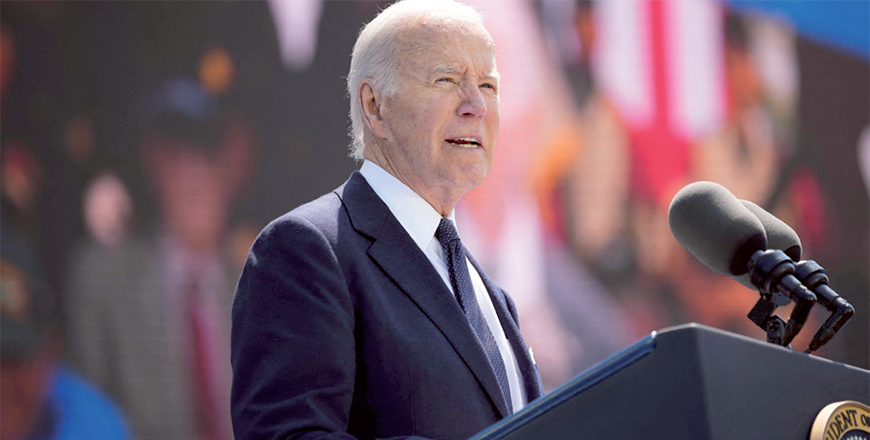You are here
‘No hero’: UK’s modest D-Day veterans keep history alive
By AFP - Apr 29,2024 - Last updated at Apr 29,2024

D-Day veterans Henry Rice and Donald Howkins (right) say their main task is to teach the younger generation about the WW2 (AFP photo)
LONDON — Donald, Ken and Henry wear their medals with pride, but reject the title of heroes even if they are among the last British veterans alive who took part in the D-Day landings in Normandy in June 1944.
The trio, all pushing 100 years or beyond, told AFP that their job now was to bear witness to history and tell the story of World War II to younger generations, as the country prepares for the 80th anniversary of the key military operation.
Despite the passing of the decades, their memories of those events remain precise and vivid.
Ken Hay, 98, set foot on Juno Beach in Courseulles-sur-Mer a few days after the first wave of soldiers landed on June 6.
“I should have been frightened. I don’t think we were. I’m no hero, I’m not trying to make myself one, but it was all part of the adventure,” he told AFP in London.
Tasked with advancing towards an inland observation post, his unit was attacked from the rear by German soldiers and he was captured, along with four other members of his regiment.
He was then transported by train to Poland with dozens of other prisoners and sent to work in a coal mine.
But Russian troops advancing from the east forced the Germans to empty the camps, with the prisoners having to walk hundreds of kilometres west.
Hay was finally liberated by American troops and was repatriated by aeroplane two days before Victory in Europe Day -- May 8, 1945 -- the date of the German surrender.
Henry Rice, also 98 years old, was in charge of communications aboard the HMS Eastway landing ship, delivering equipment to the soldiers on shore at Normandy.
“I was 50 percent excited, 50 per cent not sure,” he recalled of his mission. “For a young man, it was so big, so many ships.”
But his gaze clouded over at the memory of the thousands of men killed on the French beaches, including nearly 1,500 British on the first day.
“The mental picture I have of men in the water, I don’t like to think of that,” he said.
‘In the face of danger’
After participating in the Normandy landings, Rice served in the Mediterranean and in Asia, until the Japanese surrender that marked the end of the global conflict.
“I feel lucky” to have returned alive, he said.
Compared to other veterans, “particularly those soldiers who had landed and survived, I feel ‘petit’”, he added.
“I’m so proud of them. I was not in the face of danger like they were,” he recalled, despite dodging several enemy torpedoes.
Donald Howkins, 103, landed two days after D-Day, and recalled being “very frightened”.
“The sea was pretty rough, the barge was going up and down. But when I was on the beach I was OK. You just carried on with what you’ve got to do.”
When asked about how he feels ahead of the 80th anniversary commemorations, which many heads of state are expected to attend, he joked: “too bloody old”.
Howkins has already gone to several commemoration events in Normandy, but will not go this year as he now uses a wheelchair and the trip is too difficult.
But Ken Hay will be there and expects to experience a “mixture” of emotions.
“It’s very sad when you go to the graves... but it is also nice” to meet the French locals, he said, especially the children, who are taught about the historic events at school.
“They recognise us, want to shake your hands... it’s a lovely atmosphere.”
Like his frontline comrades, he considers it very important to keep the story of World War II alive for younger generations.
“I could warn them of the danger of war, but I would prefer to tell the leaders of countries, stop it,” said Rice.
“In this lifetime, we’ve had these horrible things,” he added, his eyes welling with tears as he recalled conflicts that have marred the globe since World War II.
Related Articles
CARENTAN, France — It might have been the longest wait but on Saturday 100-year-old American World War II veteran Harold Terens married his
OMAHA BEACH, France — US President Joe Biden on Thursday warned on the 80th anniversary of D-Day that democracy around the world was at risk
World leaders meet in Normandy on Friday for the 70th anniversary of the D-Day landings, but with Europe in its worst security crisis since the Cold War, the event will be a backdrop to urgent diplomacy over Ukraine.


















